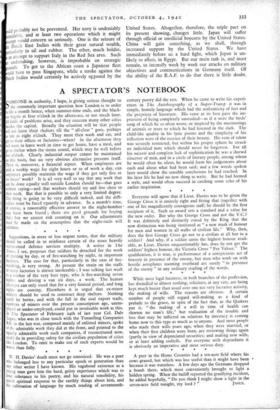A SPECTATOR'S NOTEBOOK OMEONE in authority, I hope, is giving
serious thought to the immensely important question how London is to order is life a month hence, when summer-time ends, and the black- out begins at four o'clock in the afternoon, or not much later.
kinds of problems arise, and they concern many other cities besides the capital. Broadly the situation will be that people ill not leave their shelters till the " all-clear " goes, perhaps as late as eight o'clock. They must then wash and eat, and get to their offices or factories—when? In the afternoon they will want to leave work in time to get home, have a meal, and go to shelter when the sirens sound, which may be well before five o'clock. Clearly industrial output cannot be maintained on this basis, but no very obvious alternative presents itself. There is, moreover, a financial aspect. When employees are paid a weekly wage for eight hours or so of work a day, can emp:oyers possibly maintain the wage if they get only five or six hours' work? It is all very well to say that any work that can be done equally well outside London should be—that goes without saying—and that workers should try and live close to their work. But that is possible to only a very limited degree. The thing is going to be very difficult indeed, and the diffi- culties must be faced squarely in advance. In a month's time, of course, a reasonably effective answer to the night-bomber may have been found ; there are good grounds for hoping that ; but we cannot risk counting on it. Our adjustments must ba made on the assumption that the night-raids will continue.
* * * *


























 Previous page
Previous page